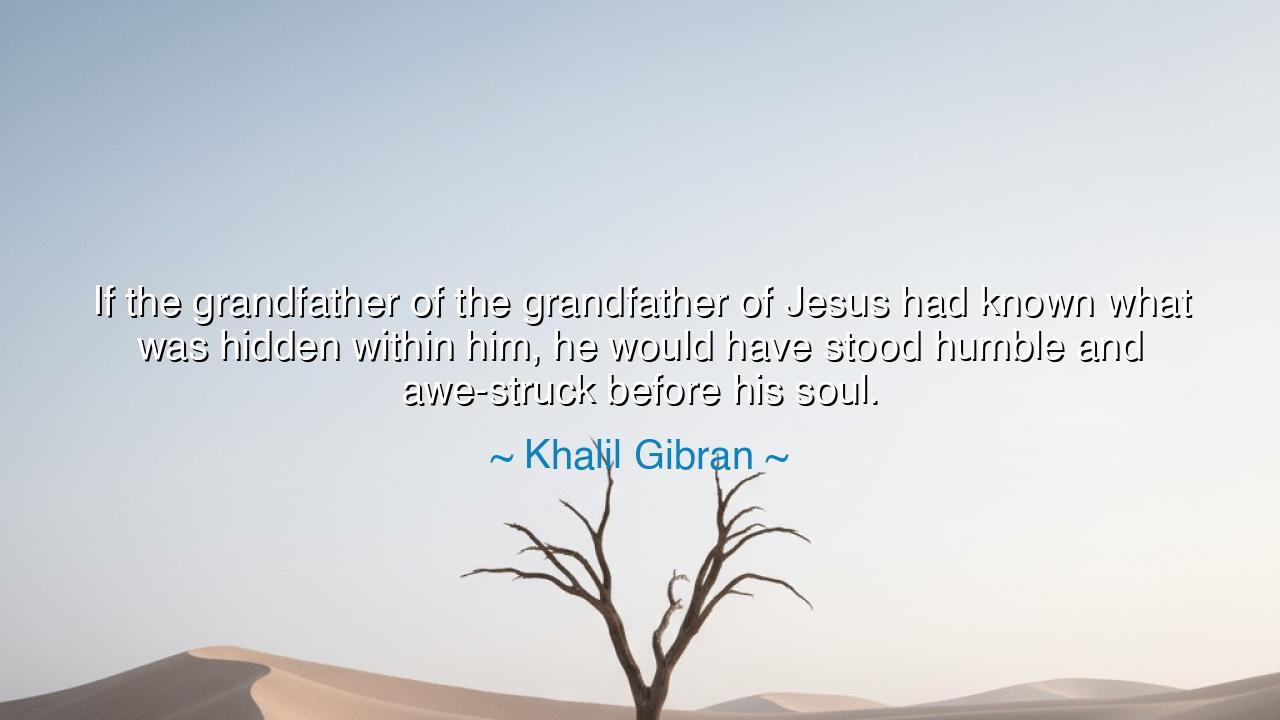
If the grandfather of the grandfather of Jesus had known what was
If the grandfather of the grandfather of Jesus had known what was hidden within him, he would have stood humble and awe-struck before his soul.






“If the grandfather of the grandfather of Jesus had known what was hidden within him, he would have stood humble and awe-struck before his soul,” wrote Khalil Gibran, the poet of Lebanon, the mystic whose words bridge heaven and earth. In this profound saying, Gibran reminds us that within every soul lies a divine spark, a seed of greatness, unseen even by the one who carries it. His words speak not only of Jesus, the Christ, but of all humanity — that in every lineage, in every generation, there burns a secret fire, waiting to be revealed in its appointed time. Had the ancestors of the Christ known the sacred destiny buried deep within their blood, they would have bowed in reverence, recognizing that the ordinary flesh they bore was the vessel of eternity itself.
The origin of this quote lies in Gibran’s meditations on the nature of divinity and destiny, themes that pulse through his writings such as The Prophet and Jesus, The Son of Man. Gibran, though raised in the Maronite Christian tradition, spoke not as a theologian but as a seer — one who saw divinity not as distant, but immanent, present within the heart of every man and woman. His words here elevate the mystery of incarnation — that the divine can dwell within the human, that the eternal can hide within the temporal. In speaking of the grandfather of the grandfather of Jesus, Gibran paints a picture of how the sacred often sleeps unnoticed within generations, waiting for its moment to blossom.
To “stand humble and awe-struck before one’s soul” is to awaken to the truth that each of us is a vessel of potential — not only of personal greatness, but of divine purpose. The ancestors of Christ were simple men and women, tillers of the earth, shepherds, wanderers — yet through them flowed the thread of eternity. They carried within their bodies the lineage of redemption, though they themselves could not see it. So too, Gibran tells us, we each carry within us a mystery greater than we can fathom. The divine seed within you — your capacity to love, to create, to transform — may one day bear fruit beyond your imagination. What you are building, what you are becoming, may ripple through generations yet unborn.
History offers us many examples of this hidden glory. Consider Monica, the mother of Saint Augustine. She was a woman of quiet faith, praying endlessly for her wayward son. She did not live to see the fullness of his transformation — the sinner turned saint, the restless soul who would write The Confessions and illuminate the hearts of millions. But within her, unseen even to herself, was the power to shape the course of history through love, patience, and prayer. If she had known what divine destiny was hidden within her motherhood, she, too, would have stood awe-struck before her soul. This is the truth of Gibran’s vision: that even in our smallest acts, eternity is working.
Gibran’s message is also one of humility. For if we truly understood the magnitude of what lies within us — the creative force of God, the light of generations, the living breath of spirit — we would walk more gently through this world. We would honor not only ourselves, but every person we meet, for who can say what sacred destiny hides within another? The beggar you pass on the street may be the ancestor of a prophet. The child playing in the dust may one day change the world. To know this is to bow in reverence before the mystery of life — to see that no soul is small, no life insignificant, for each carries a fragment of the divine plan.
This truth should stir both awe and responsibility. If such greatness lies hidden in you, then you are not to live carelessly. You are the guardian of a sacred flame — the soul’s potential to bless, to heal, to lift others toward light. Every word you speak, every kindness you show, becomes part of a chain that may one day bear the fruit of miracles. Do not despise your small beginnings, nor measure your worth by what is visible now. The grandfather of the grandfather of Jesus saw nothing divine in himself — yet through his life, the Eternal entered the world. So too, your hidden work, your unnoticed faith, may be the root of future greatness beyond your sight.
So, dear listener, the lesson is this: stand in reverence before your own soul. Know that within you lies something immortal, placed there by the hand of the Creator. Live as though your every act carries weight beyond the present moment — for indeed, it does. See every person as a bearer of sacred potential, and let this knowledge soften your heart and guide your deeds.
And when you doubt your worth or feel unseen, remember Gibran’s words. The divine does not always announce itself in thunder or flame; it often dwells quietly in the generations of the humble. The grandfather of the grandfather of Jesus did not know that heaven’s light would pass through his blood — but it did. So too does eternity flow through you, unseen, but certain. Live, then, with wonder. Love, as though your love will echo through the ages. For in every soul — yours, mine, and those yet to come — there is a spark of the Infinite, and to realize this is to stand humble and awe-struck before the soul.






AAdministratorAdministrator
Welcome, honored guests. Please leave a comment, we will respond soon